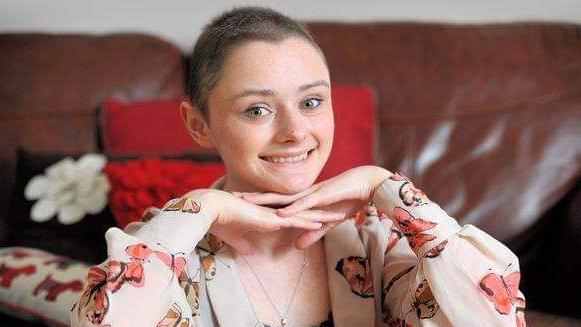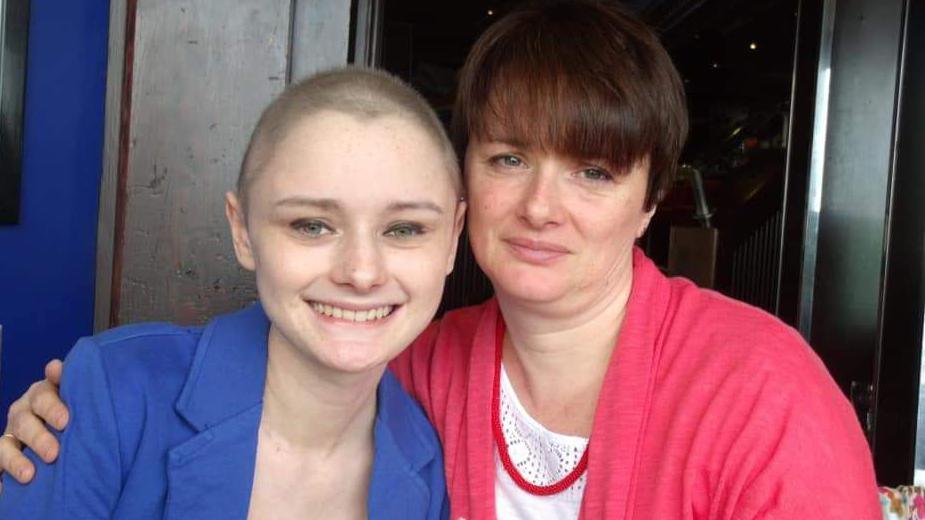Teen told she had 'good cancer' died from treatment

Emily and her family were reassured her cancer was not life-threatening, but she died from complications
- Published
When Emily was diagnosed with non-Hodgkin lymphoma, external, doctors told her it was a “good cancer” to have - but she died aged 18 because of the side effects of treatment.
Her mum Donna Dunn from Cwmbran, Torfaen, said there were “huge holes” in support for blood cancers in Wales, while a consultant haematologist said the workforce was “overstretched and understaffed”.
Dr Ceri Bygrave highlighted "crumbling NHS infrastructure", woeful IT systems and an ageing specialist workforce as major issues.
The Welsh government said cancer was one of the NHS' top planning priorities and a £2m national programme was tackling waiting times.
Family’s donor plea as son battles rare cancer
- Published4 March 2024
I won't ignore cancer tests like mum did, says BBC presenter
- Published10 May 2024
Barely anyone's heard of my incurable cancer
- Published22 June 2024
Non-Hodgkin lymphoma is a type of blood cancer that affects white blood cells called lymphocytes, which form part of your immune system.
There are 100 different types of blood cancer, including leukaemia, lymphoma and myeloma.
Blood cancer is the UK’s third biggest cancer killer and, despite 16,000 deaths annually, there is much lower awareness and understanding, according to Blood Cancer UK, external.
The charity said the UK was behind all similar nations in survival rates for every type of blood cancer.
But it said the situation in Wales was particularly acute, where patient care “lags a long way behind other centres in England”.

Emily's family have called for more awareness and support for people who have blood cancers
“Blood cancer is such a complicated disease, and yet I was told when Emily was diagnosed it was a ‘good cancer’ to have,” Ms Dunn said.
Her daughter was an A-grade student, and with this reassurance, her mother added: “Even in hospital she studied hard and she treated it as an opportunity to talk to the doctors about careers.”
Emily initially had treatment in Cardiff, but needed more specialist help in Bristol as her condition worsened.
However, because of complications caused by her treatment, she was too unwell to travel over the border to receive it.
She died in 2016, and her mother added: “Grief doesn’t get any easier, it just changes. We still miss her and talk about her every day.”
Dr Bygrave, a consultant haematologist at Cardiff’s University Hospital of Wales, said the workforce was “overstretched and understaffed”, with those delivering complex treatments “under major pressure”.
What is non-Hodgkin lymphoma?
Non-Hodgkin lymphoma is a type of cancer that develops in the lymphatic system, which is a network of vessels and glands in your body
The lymphatic system is part of your immune system
In non-Hodgkin lymphoma, white blood cells known as lymphocytes start to multiply in an abnormal way
The affected lymphocytes lose their ability to fight infections
The most common symptom is a painless swelling in a lymph node, usually in the neck, armpit or groin
Source: NHS, external
“This is a particular challenge in Wales where by 2032, 74% of permanent haematology consultants will reach the age of 60 with a shortfall in trainees to replace them,” she added.
“The crumbling NHS infrastructure that exists in Wales and a woeful IT infrastructure that lags a long way behind other centres in England are all things that compromise blood cancer patient care on a daily basis.”
She said that to improve survival rates, there must be an increase in the number of blood cancer clinical nurse specialists, as well as encouragement for more clinicians to carry out blood cancer research.
Blood Cancer UK has published an action plan for improving the situation, which includes developing the workforce, early diagnosis initiatives, reducing barriers to accessing care, and increasing access to treatments.
It said a patient's social background and where they live were also significant factors in survival chances.
Blood Cancer UK’s Chief Executive Helen Rowntree said: “We're confident that if the Welsh government, NHS Wales and all policymakers come together to address our recommendations in Wales, it will contribute to making the UK a leader for blood cancer treatment for people no matter who they are or where they live.”
A Welsh government spokesperson said: “A record number of staff are working in the NHS and we have continued to invest in the haematology workforce over the past decade.
“This includes a 20% increase in consultant and a 56% increase in specialty and associate specialist doctors.
“We are investing heavily in cancer services, both in terms of new equipment and facilities."